Digital Transformation: Features, Value, Challenges & Implementation
VerifiedAdded on 2023/06/16
|12
|3193
|438
Report
AI Summary
This report provides a comprehensive overview of digital transformation within business organizations. It begins by defining digital transformation as the integration of new digital technologies to meet market demands and adapt to changing business environments, emphasizing its impact on business culture, processes, and customer experiences. The report highlights key features and functions of digital transformation, such as its ubiquitous presence across various sectors, focus on enhancing customer experience, the importance of well-defined operational processes, data-driven decision-making, and its role in facilitating global business operations. It further explores the potential value of digital transformation, including improved efficiency, cost savings, better customer experiences, increased flexibility, enhanced supply chain management, competitive advantage, and improved employee engagement. The report also addresses various challenges in embracing digital technologies and implementation issues, such as lack of IT skills, evolving customer needs, unclear strategies, ineffective data management, lack of organizational change management, and budget concerns. Finally, it highlights the differences between traditional and digitally transformed organizations, emphasizing the shift towards customer-centricity, data-driven decisions, and agility in responding to market changes.
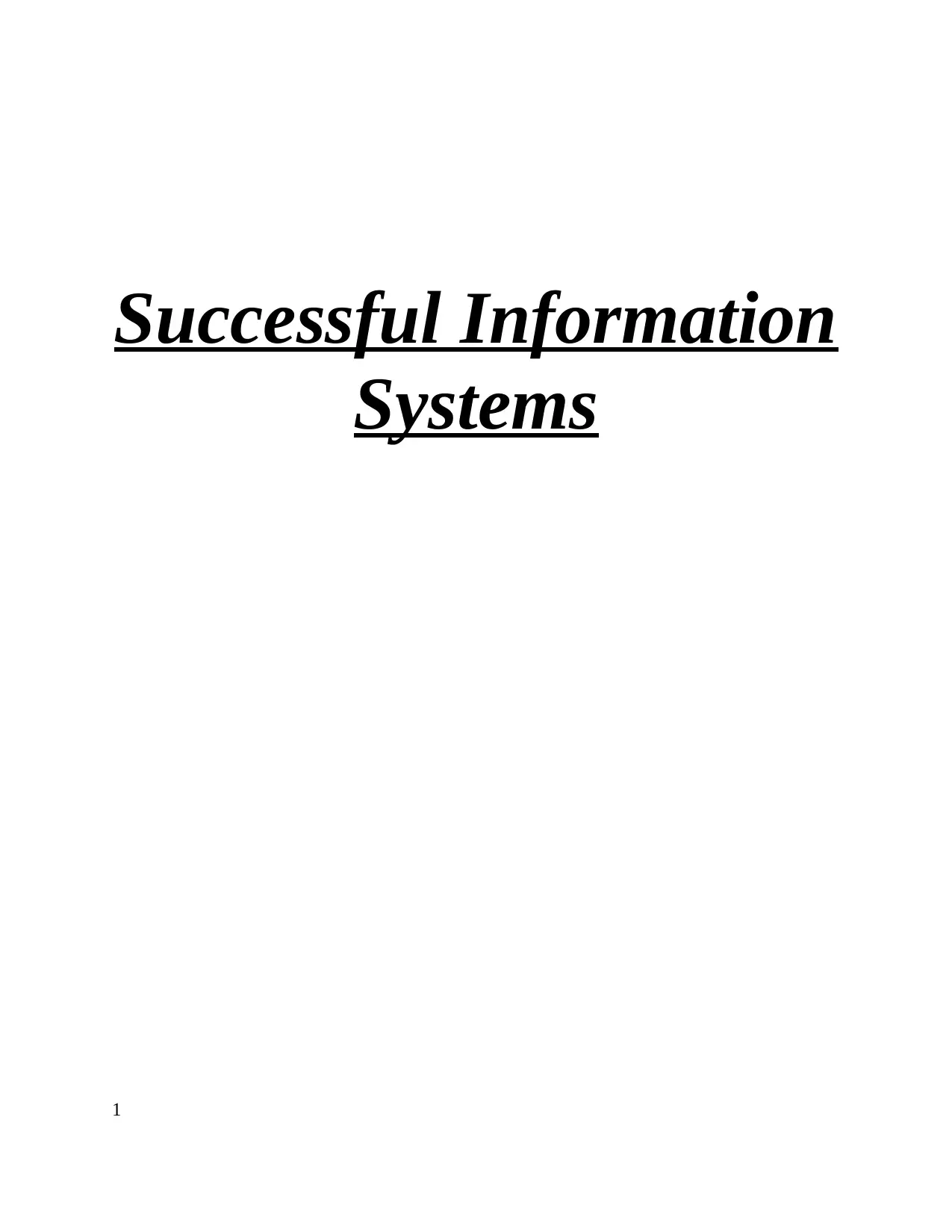
Successful Information
Systems
1
Systems
1
Paraphrase This Document
Need a fresh take? Get an instant paraphrase of this document with our AI Paraphraser
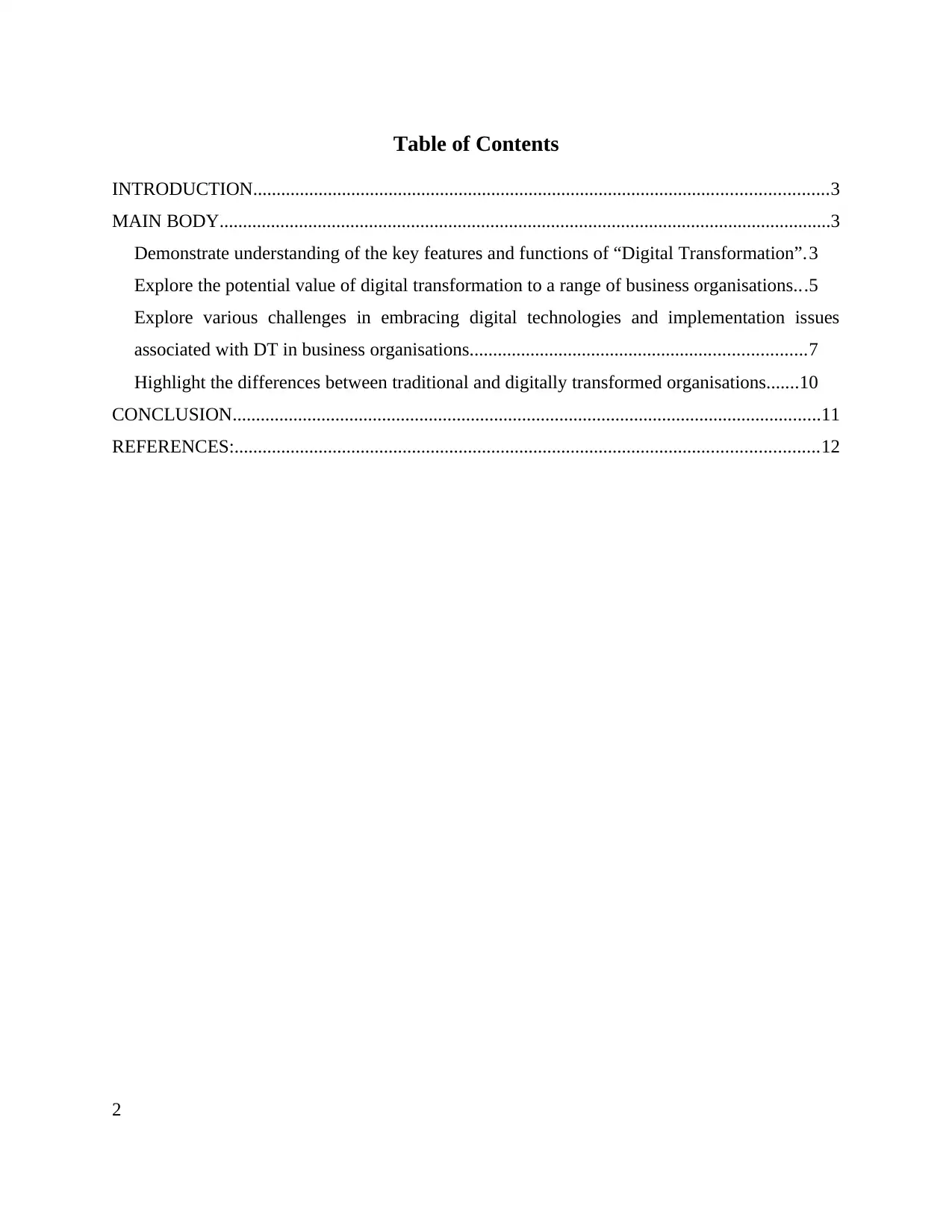
Table of Contents
INTRODUCTION...........................................................................................................................3
MAIN BODY...................................................................................................................................3
Demonstrate understanding of the key features and functions of “Digital Transformation”.3
Explore the potential value of digital transformation to a range of business organisations...5
Explore various challenges in embracing digital technologies and implementation issues
associated with DT in business organisations........................................................................7
Highlight the differences between traditional and digitally transformed organisations.......10
CONCLUSION..............................................................................................................................11
REFERENCES:.............................................................................................................................12
2
INTRODUCTION...........................................................................................................................3
MAIN BODY...................................................................................................................................3
Demonstrate understanding of the key features and functions of “Digital Transformation”.3
Explore the potential value of digital transformation to a range of business organisations...5
Explore various challenges in embracing digital technologies and implementation issues
associated with DT in business organisations........................................................................7
Highlight the differences between traditional and digitally transformed organisations.......10
CONCLUSION..............................................................................................................................11
REFERENCES:.............................................................................................................................12
2
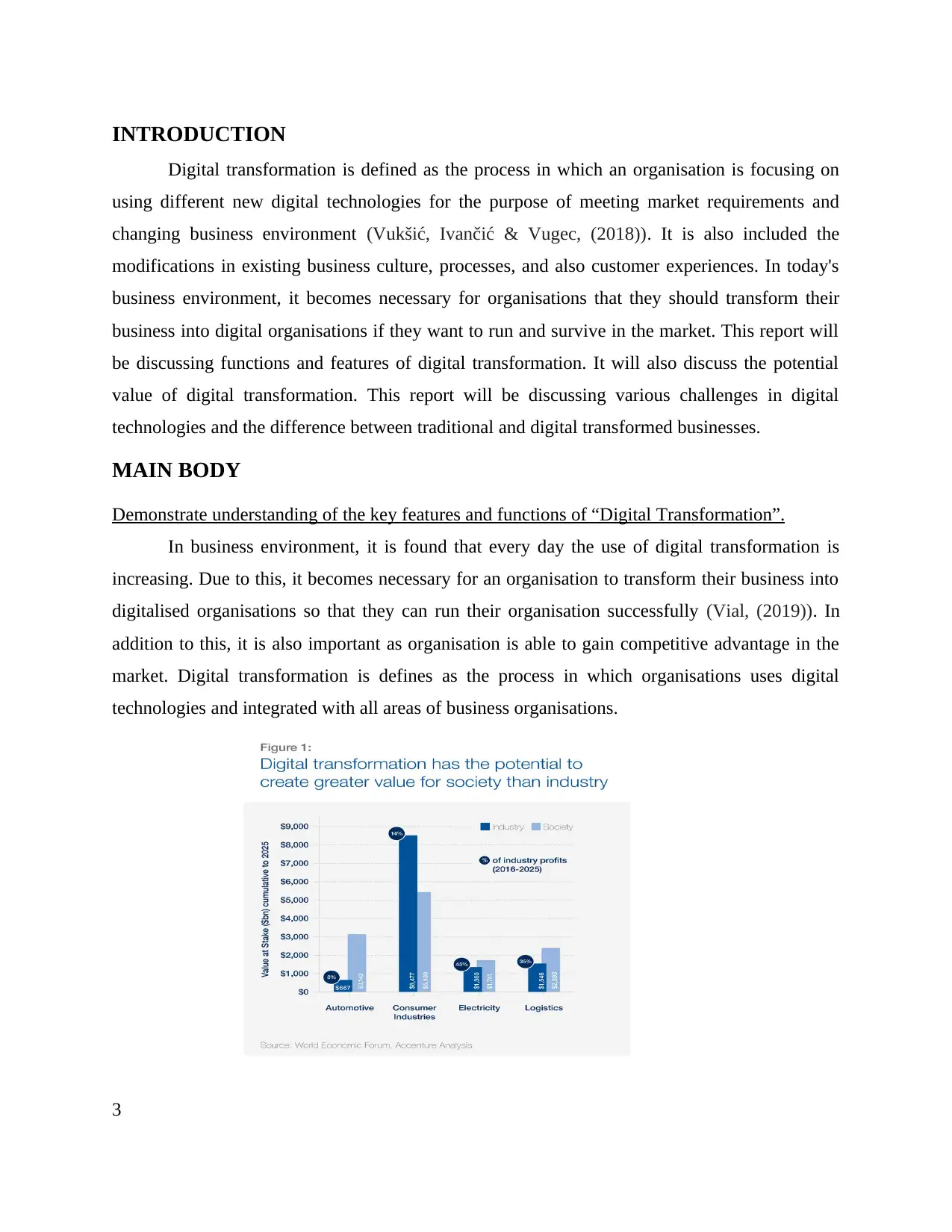
INTRODUCTION
Digital transformation is defined as the process in which an organisation is focusing on
using different new digital technologies for the purpose of meeting market requirements and
changing business environment (Vukšić, Ivančić & Vugec, (2018)). It is also included the
modifications in existing business culture, processes, and also customer experiences. In today's
business environment, it becomes necessary for organisations that they should transform their
business into digital organisations if they want to run and survive in the market. This report will
be discussing functions and features of digital transformation. It will also discuss the potential
value of digital transformation. This report will be discussing various challenges in digital
technologies and the difference between traditional and digital transformed businesses.
MAIN BODY
Demonstrate understanding of the key features and functions of “Digital Transformation”.
In business environment, it is found that every day the use of digital transformation is
increasing. Due to this, it becomes necessary for an organisation to transform their business into
digitalised organisations so that they can run their organisation successfully (Vial, (2019)). In
addition to this, it is also important as organisation is able to gain competitive advantage in the
market. Digital transformation is defines as the process in which organisations uses digital
technologies and integrated with all areas of business organisations.
3
Digital transformation is defined as the process in which an organisation is focusing on
using different new digital technologies for the purpose of meeting market requirements and
changing business environment (Vukšić, Ivančić & Vugec, (2018)). It is also included the
modifications in existing business culture, processes, and also customer experiences. In today's
business environment, it becomes necessary for organisations that they should transform their
business into digital organisations if they want to run and survive in the market. This report will
be discussing functions and features of digital transformation. It will also discuss the potential
value of digital transformation. This report will be discussing various challenges in digital
technologies and the difference between traditional and digital transformed businesses.
MAIN BODY
Demonstrate understanding of the key features and functions of “Digital Transformation”.
In business environment, it is found that every day the use of digital transformation is
increasing. Due to this, it becomes necessary for an organisation to transform their business into
digitalised organisations so that they can run their organisation successfully (Vial, (2019)). In
addition to this, it is also important as organisation is able to gain competitive advantage in the
market. Digital transformation is defines as the process in which organisations uses digital
technologies and integrated with all areas of business organisations.
3
⊘ This is a preview!⊘
Do you want full access?
Subscribe today to unlock all pages.

Trusted by 1+ million students worldwide
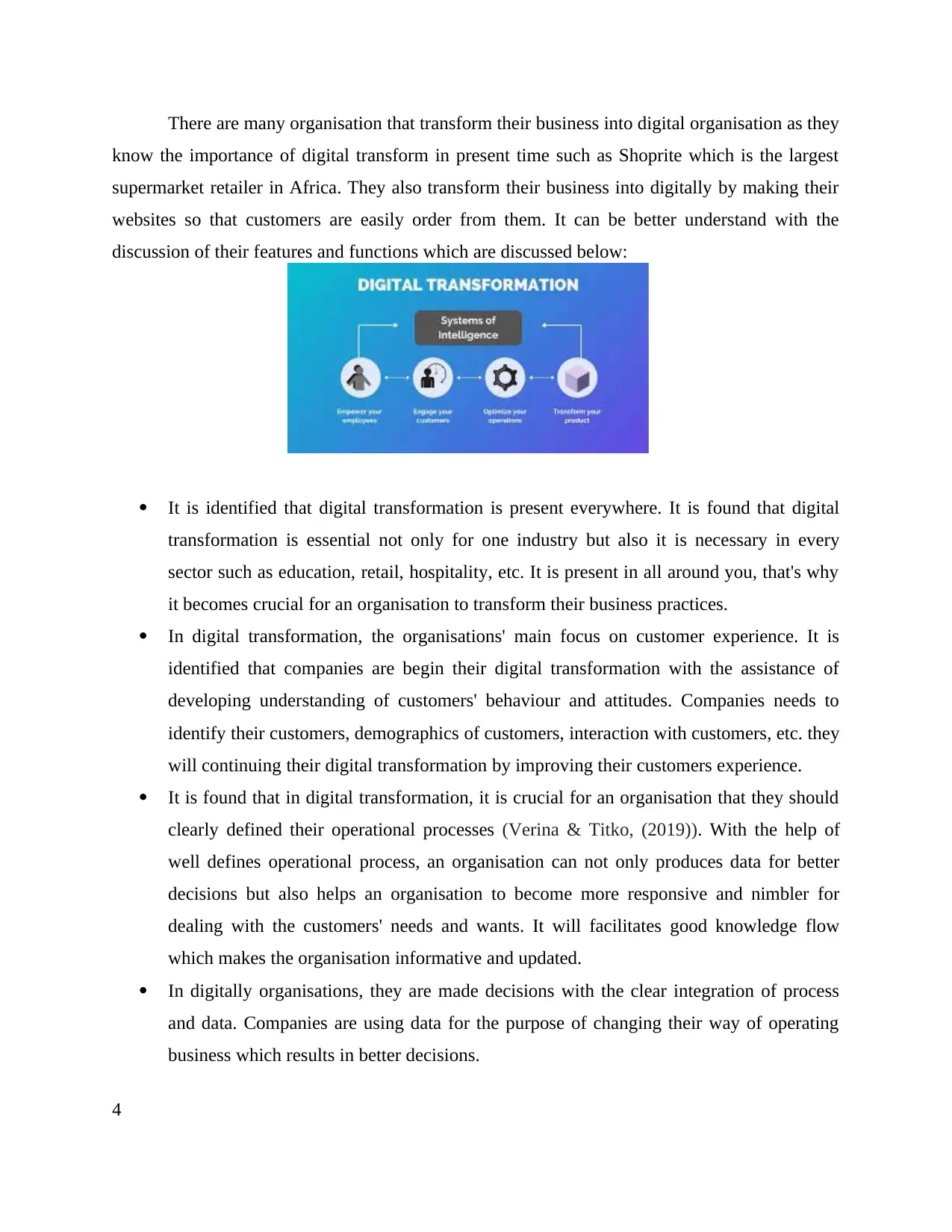
There are many organisation that transform their business into digital organisation as they
know the importance of digital transform in present time such as Shoprite which is the largest
supermarket retailer in Africa. They also transform their business into digitally by making their
websites so that customers are easily order from them. It can be better understand with the
discussion of their features and functions which are discussed below:
It is identified that digital transformation is present everywhere. It is found that digital
transformation is essential not only for one industry but also it is necessary in every
sector such as education, retail, hospitality, etc. It is present in all around you, that's why
it becomes crucial for an organisation to transform their business practices.
In digital transformation, the organisations' main focus on customer experience. It is
identified that companies are begin their digital transformation with the assistance of
developing understanding of customers' behaviour and attitudes. Companies needs to
identify their customers, demographics of customers, interaction with customers, etc. they
will continuing their digital transformation by improving their customers experience.
It is found that in digital transformation, it is crucial for an organisation that they should
clearly defined their operational processes (Verina & Titko, (2019)). With the help of
well defines operational process, an organisation can not only produces data for better
decisions but also helps an organisation to become more responsive and nimbler for
dealing with the customers' needs and wants. It will facilitates good knowledge flow
which makes the organisation informative and updated.
In digitally organisations, they are made decisions with the clear integration of process
and data. Companies are using data for the purpose of changing their way of operating
business which results in better decisions.
4
know the importance of digital transform in present time such as Shoprite which is the largest
supermarket retailer in Africa. They also transform their business into digitally by making their
websites so that customers are easily order from them. It can be better understand with the
discussion of their features and functions which are discussed below:
It is identified that digital transformation is present everywhere. It is found that digital
transformation is essential not only for one industry but also it is necessary in every
sector such as education, retail, hospitality, etc. It is present in all around you, that's why
it becomes crucial for an organisation to transform their business practices.
In digital transformation, the organisations' main focus on customer experience. It is
identified that companies are begin their digital transformation with the assistance of
developing understanding of customers' behaviour and attitudes. Companies needs to
identify their customers, demographics of customers, interaction with customers, etc. they
will continuing their digital transformation by improving their customers experience.
It is found that in digital transformation, it is crucial for an organisation that they should
clearly defined their operational processes (Verina & Titko, (2019)). With the help of
well defines operational process, an organisation can not only produces data for better
decisions but also helps an organisation to become more responsive and nimbler for
dealing with the customers' needs and wants. It will facilitates good knowledge flow
which makes the organisation informative and updated.
In digitally organisations, they are made decisions with the clear integration of process
and data. Companies are using data for the purpose of changing their way of operating
business which results in better decisions.
4
Paraphrase This Document
Need a fresh take? Get an instant paraphrase of this document with our AI Paraphraser
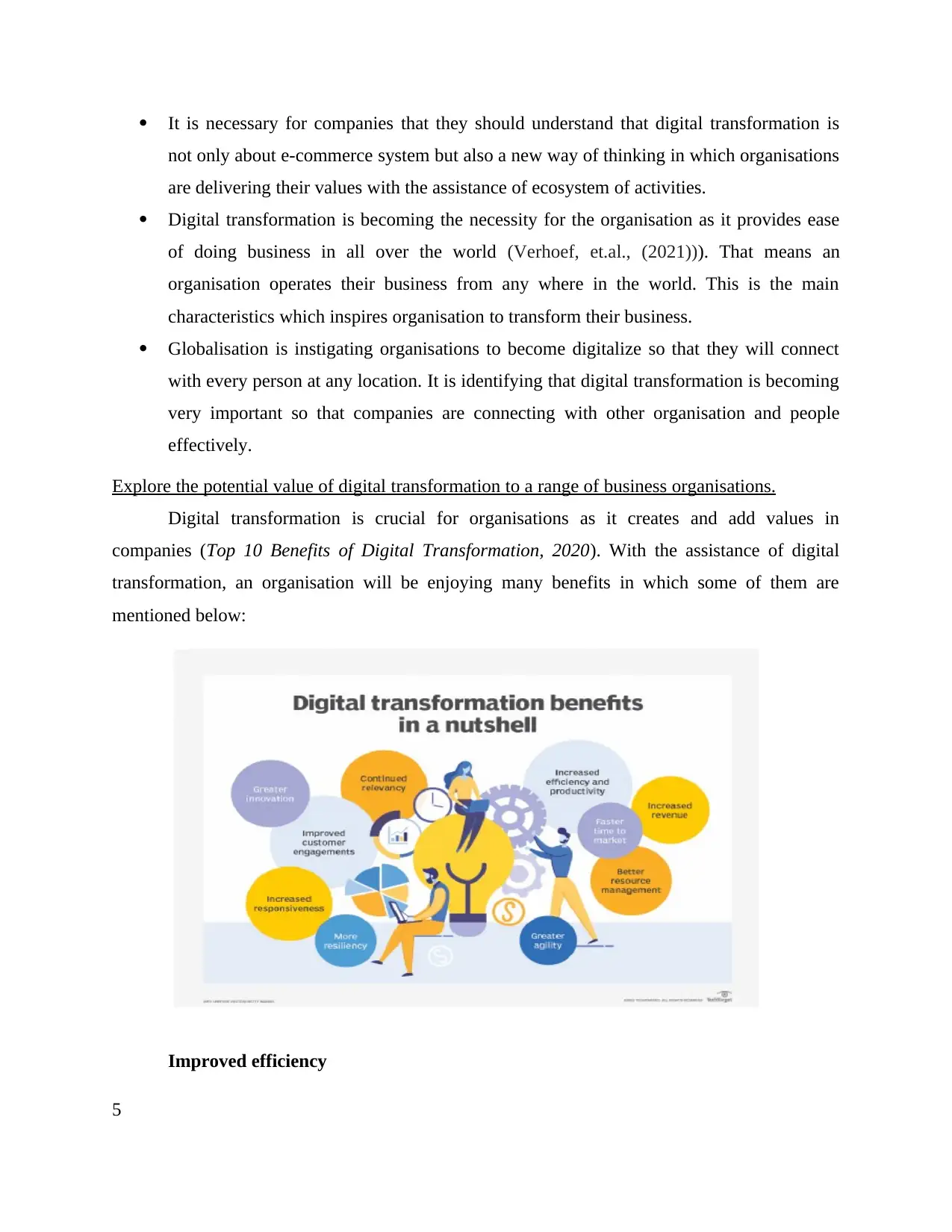
It is necessary for companies that they should understand that digital transformation is
not only about e-commerce system but also a new way of thinking in which organisations
are delivering their values with the assistance of ecosystem of activities.
Digital transformation is becoming the necessity for the organisation as it provides ease
of doing business in all over the world (Verhoef, et.al., (2021))). That means an
organisation operates their business from any where in the world. This is the main
characteristics which inspires organisation to transform their business.
Globalisation is instigating organisations to become digitalize so that they will connect
with every person at any location. It is identifying that digital transformation is becoming
very important so that companies are connecting with other organisation and people
effectively.
Explore the potential value of digital transformation to a range of business organisations.
Digital transformation is crucial for organisations as it creates and add values in
companies (Top 10 Benefits of Digital Transformation, 2020). With the assistance of digital
transformation, an organisation will be enjoying many benefits in which some of them are
mentioned below:
Improved efficiency
5
not only about e-commerce system but also a new way of thinking in which organisations
are delivering their values with the assistance of ecosystem of activities.
Digital transformation is becoming the necessity for the organisation as it provides ease
of doing business in all over the world (Verhoef, et.al., (2021))). That means an
organisation operates their business from any where in the world. This is the main
characteristics which inspires organisation to transform their business.
Globalisation is instigating organisations to become digitalize so that they will connect
with every person at any location. It is identifying that digital transformation is becoming
very important so that companies are connecting with other organisation and people
effectively.
Explore the potential value of digital transformation to a range of business organisations.
Digital transformation is crucial for organisations as it creates and add values in
companies (Top 10 Benefits of Digital Transformation, 2020). With the assistance of digital
transformation, an organisation will be enjoying many benefits in which some of them are
mentioned below:
Improved efficiency
5
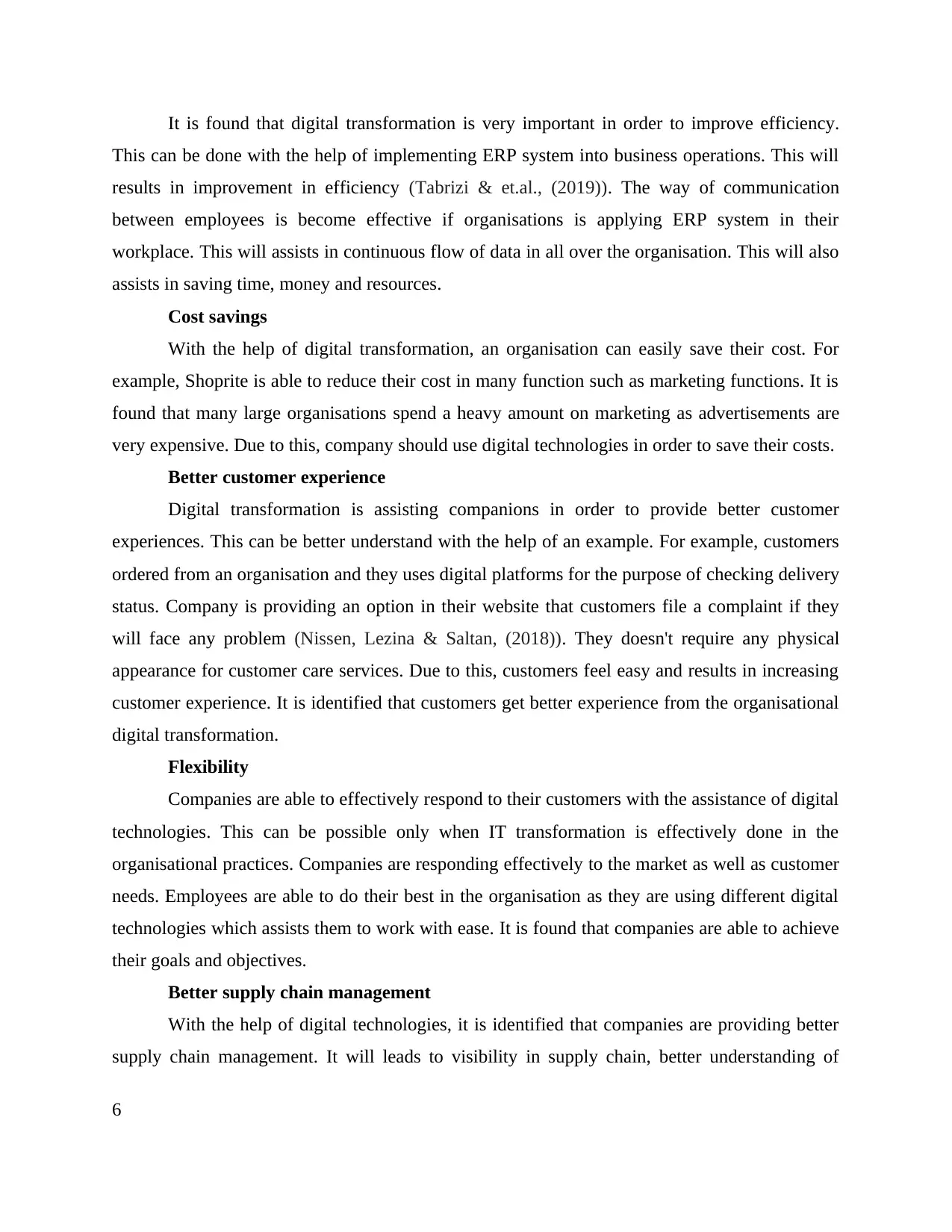
It is found that digital transformation is very important in order to improve efficiency.
This can be done with the help of implementing ERP system into business operations. This will
results in improvement in efficiency (Tabrizi & et.al., (2019)). The way of communication
between employees is become effective if organisations is applying ERP system in their
workplace. This will assists in continuous flow of data in all over the organisation. This will also
assists in saving time, money and resources.
Cost savings
With the help of digital transformation, an organisation can easily save their cost. For
example, Shoprite is able to reduce their cost in many function such as marketing functions. It is
found that many large organisations spend a heavy amount on marketing as advertisements are
very expensive. Due to this, company should use digital technologies in order to save their costs.
Better customer experience
Digital transformation is assisting companions in order to provide better customer
experiences. This can be better understand with the help of an example. For example, customers
ordered from an organisation and they uses digital platforms for the purpose of checking delivery
status. Company is providing an option in their website that customers file a complaint if they
will face any problem (Nissen, Lezina & Saltan, (2018)). They doesn't require any physical
appearance for customer care services. Due to this, customers feel easy and results in increasing
customer experience. It is identified that customers get better experience from the organisational
digital transformation.
Flexibility
Companies are able to effectively respond to their customers with the assistance of digital
technologies. This can be possible only when IT transformation is effectively done in the
organisational practices. Companies are responding effectively to the market as well as customer
needs. Employees are able to do their best in the organisation as they are using different digital
technologies which assists them to work with ease. It is found that companies are able to achieve
their goals and objectives.
Better supply chain management
With the help of digital technologies, it is identified that companies are providing better
supply chain management. It will leads to visibility in supply chain, better understanding of
6
This can be done with the help of implementing ERP system into business operations. This will
results in improvement in efficiency (Tabrizi & et.al., (2019)). The way of communication
between employees is become effective if organisations is applying ERP system in their
workplace. This will assists in continuous flow of data in all over the organisation. This will also
assists in saving time, money and resources.
Cost savings
With the help of digital transformation, an organisation can easily save their cost. For
example, Shoprite is able to reduce their cost in many function such as marketing functions. It is
found that many large organisations spend a heavy amount on marketing as advertisements are
very expensive. Due to this, company should use digital technologies in order to save their costs.
Better customer experience
Digital transformation is assisting companions in order to provide better customer
experiences. This can be better understand with the help of an example. For example, customers
ordered from an organisation and they uses digital platforms for the purpose of checking delivery
status. Company is providing an option in their website that customers file a complaint if they
will face any problem (Nissen, Lezina & Saltan, (2018)). They doesn't require any physical
appearance for customer care services. Due to this, customers feel easy and results in increasing
customer experience. It is identified that customers get better experience from the organisational
digital transformation.
Flexibility
Companies are able to effectively respond to their customers with the assistance of digital
technologies. This can be possible only when IT transformation is effectively done in the
organisational practices. Companies are responding effectively to the market as well as customer
needs. Employees are able to do their best in the organisation as they are using different digital
technologies which assists them to work with ease. It is found that companies are able to achieve
their goals and objectives.
Better supply chain management
With the help of digital technologies, it is identified that companies are providing better
supply chain management. It will leads to visibility in supply chain, better understanding of
6
⊘ This is a preview!⊘
Do you want full access?
Subscribe today to unlock all pages.

Trusted by 1+ million students worldwide
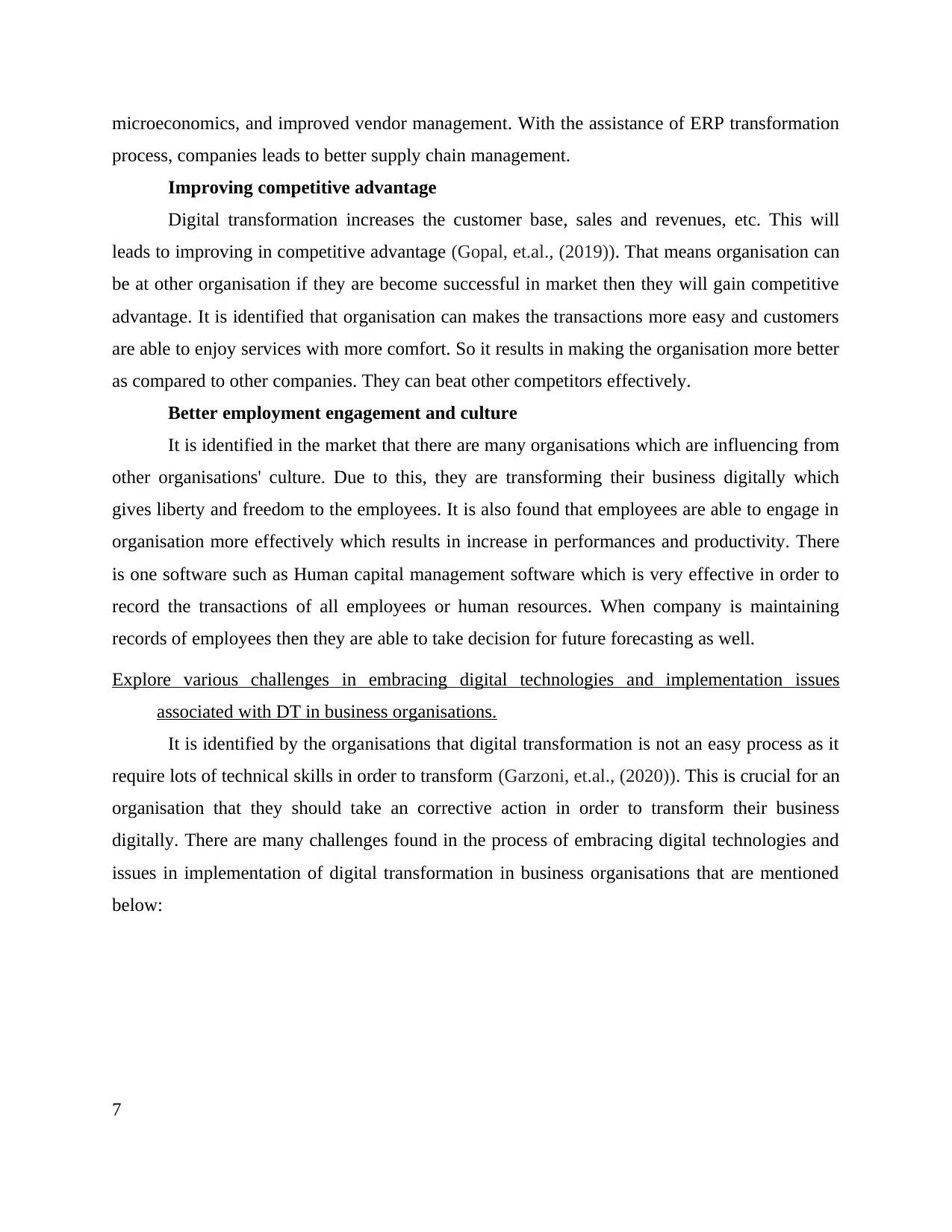
microeconomics, and improved vendor management. With the assistance of ERP transformation
process, companies leads to better supply chain management.
Improving competitive advantage
Digital transformation increases the customer base, sales and revenues, etc. This will
leads to improving in competitive advantage (Gopal, et.al., (2019)). That means organisation can
be at other organisation if they are become successful in market then they will gain competitive
advantage. It is identified that organisation can makes the transactions more easy and customers
are able to enjoy services with more comfort. So it results in making the organisation more better
as compared to other companies. They can beat other competitors effectively.
Better employment engagement and culture
It is identified in the market that there are many organisations which are influencing from
other organisations' culture. Due to this, they are transforming their business digitally which
gives liberty and freedom to the employees. It is also found that employees are able to engage in
organisation more effectively which results in increase in performances and productivity. There
is one software such as Human capital management software which is very effective in order to
record the transactions of all employees or human resources. When company is maintaining
records of employees then they are able to take decision for future forecasting as well.
Explore various challenges in embracing digital technologies and implementation issues
associated with DT in business organisations.
It is identified by the organisations that digital transformation is not an easy process as it
require lots of technical skills in order to transform (Garzoni, et.al., (2020)). This is crucial for an
organisation that they should take an corrective action in order to transform their business
digitally. There are many challenges found in the process of embracing digital technologies and
issues in implementation of digital transformation in business organisations that are mentioned
below:
7
process, companies leads to better supply chain management.
Improving competitive advantage
Digital transformation increases the customer base, sales and revenues, etc. This will
leads to improving in competitive advantage (Gopal, et.al., (2019)). That means organisation can
be at other organisation if they are become successful in market then they will gain competitive
advantage. It is identified that organisation can makes the transactions more easy and customers
are able to enjoy services with more comfort. So it results in making the organisation more better
as compared to other companies. They can beat other competitors effectively.
Better employment engagement and culture
It is identified in the market that there are many organisations which are influencing from
other organisations' culture. Due to this, they are transforming their business digitally which
gives liberty and freedom to the employees. It is also found that employees are able to engage in
organisation more effectively which results in increase in performances and productivity. There
is one software such as Human capital management software which is very effective in order to
record the transactions of all employees or human resources. When company is maintaining
records of employees then they are able to take decision for future forecasting as well.
Explore various challenges in embracing digital technologies and implementation issues
associated with DT in business organisations.
It is identified by the organisations that digital transformation is not an easy process as it
require lots of technical skills in order to transform (Garzoni, et.al., (2020)). This is crucial for an
organisation that they should take an corrective action in order to transform their business
digitally. There are many challenges found in the process of embracing digital technologies and
issues in implementation of digital transformation in business organisations that are mentioned
below:
7
Paraphrase This Document
Need a fresh take? Get an instant paraphrase of this document with our AI Paraphraser
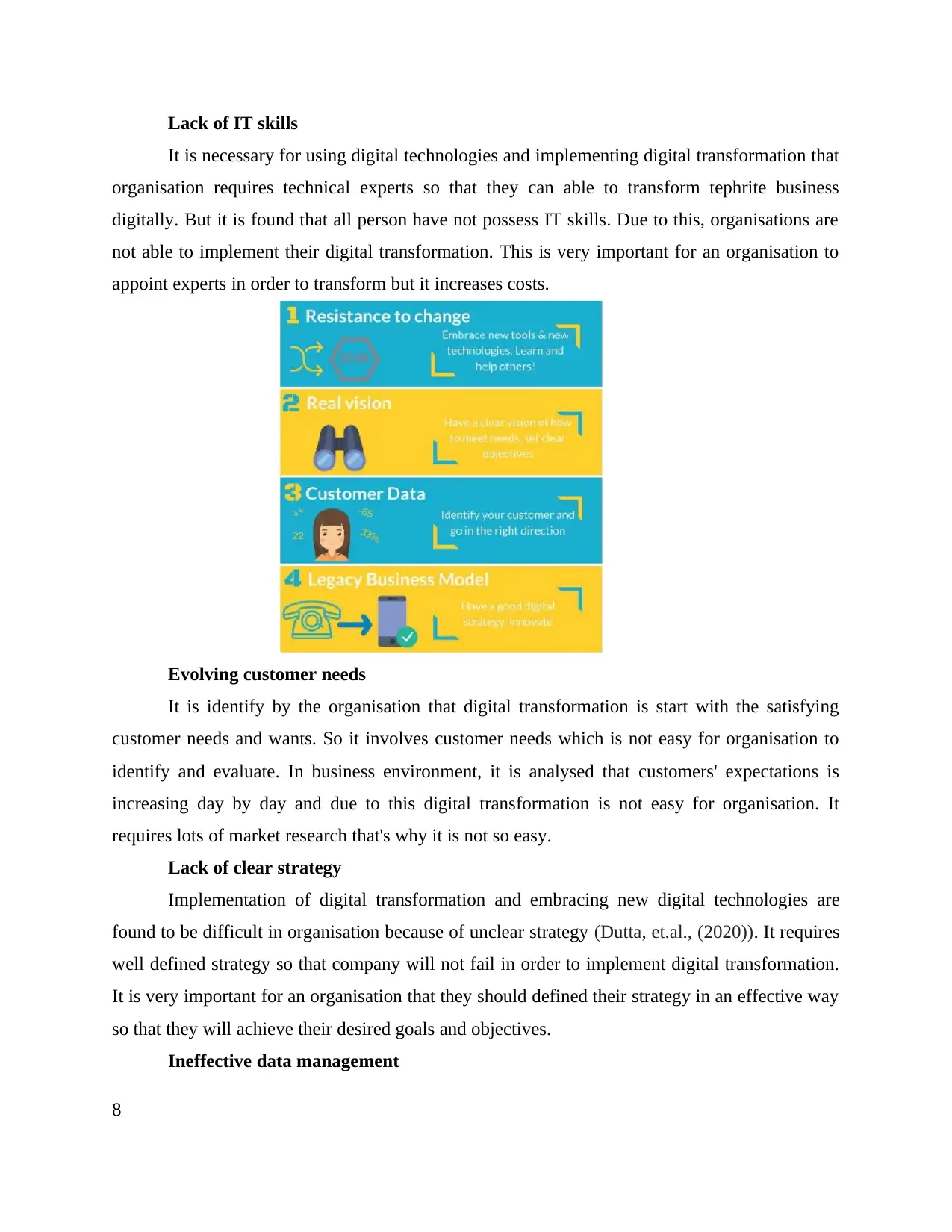
Lack of IT skills
It is necessary for using digital technologies and implementing digital transformation that
organisation requires technical experts so that they can able to transform tephrite business
digitally. But it is found that all person have not possess IT skills. Due to this, organisations are
not able to implement their digital transformation. This is very important for an organisation to
appoint experts in order to transform but it increases costs.
Evolving customer needs
It is identify by the organisation that digital transformation is start with the satisfying
customer needs and wants. So it involves customer needs which is not easy for organisation to
identify and evaluate. In business environment, it is analysed that customers' expectations is
increasing day by day and due to this digital transformation is not easy for organisation. It
requires lots of market research that's why it is not so easy.
Lack of clear strategy
Implementation of digital transformation and embracing new digital technologies are
found to be difficult in organisation because of unclear strategy (Dutta, et.al., (2020)). It requires
well defined strategy so that company will not fail in order to implement digital transformation.
It is very important for an organisation that they should defined their strategy in an effective way
so that they will achieve their desired goals and objectives.
Ineffective data management
8
It is necessary for using digital technologies and implementing digital transformation that
organisation requires technical experts so that they can able to transform tephrite business
digitally. But it is found that all person have not possess IT skills. Due to this, organisations are
not able to implement their digital transformation. This is very important for an organisation to
appoint experts in order to transform but it increases costs.
Evolving customer needs
It is identify by the organisation that digital transformation is start with the satisfying
customer needs and wants. So it involves customer needs which is not easy for organisation to
identify and evaluate. In business environment, it is analysed that customers' expectations is
increasing day by day and due to this digital transformation is not easy for organisation. It
requires lots of market research that's why it is not so easy.
Lack of clear strategy
Implementation of digital transformation and embracing new digital technologies are
found to be difficult in organisation because of unclear strategy (Dutta, et.al., (2020)). It requires
well defined strategy so that company will not fail in order to implement digital transformation.
It is very important for an organisation that they should defined their strategy in an effective way
so that they will achieve their desired goals and objectives.
Ineffective data management
8
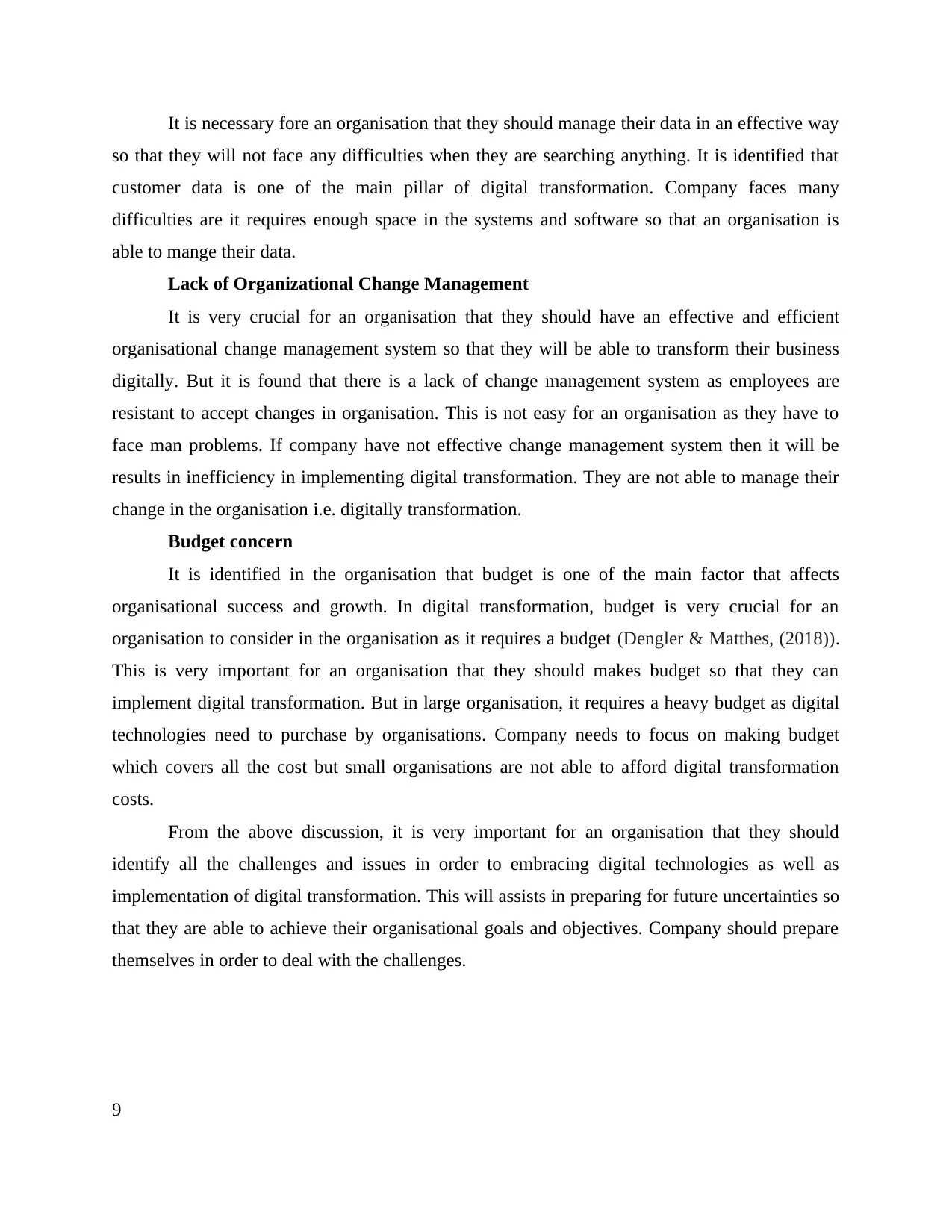
It is necessary fore an organisation that they should manage their data in an effective way
so that they will not face any difficulties when they are searching anything. It is identified that
customer data is one of the main pillar of digital transformation. Company faces many
difficulties are it requires enough space in the systems and software so that an organisation is
able to mange their data.
Lack of Organizational Change Management
It is very crucial for an organisation that they should have an effective and efficient
organisational change management system so that they will be able to transform their business
digitally. But it is found that there is a lack of change management system as employees are
resistant to accept changes in organisation. This is not easy for an organisation as they have to
face man problems. If company have not effective change management system then it will be
results in inefficiency in implementing digital transformation. They are not able to manage their
change in the organisation i.e. digitally transformation.
Budget concern
It is identified in the organisation that budget is one of the main factor that affects
organisational success and growth. In digital transformation, budget is very crucial for an
organisation to consider in the organisation as it requires a budget (Dengler & Matthes, (2018)).
This is very important for an organisation that they should makes budget so that they can
implement digital transformation. But in large organisation, it requires a heavy budget as digital
technologies need to purchase by organisations. Company needs to focus on making budget
which covers all the cost but small organisations are not able to afford digital transformation
costs.
From the above discussion, it is very important for an organisation that they should
identify all the challenges and issues in order to embracing digital technologies as well as
implementation of digital transformation. This will assists in preparing for future uncertainties so
that they are able to achieve their organisational goals and objectives. Company should prepare
themselves in order to deal with the challenges.
9
so that they will not face any difficulties when they are searching anything. It is identified that
customer data is one of the main pillar of digital transformation. Company faces many
difficulties are it requires enough space in the systems and software so that an organisation is
able to mange their data.
Lack of Organizational Change Management
It is very crucial for an organisation that they should have an effective and efficient
organisational change management system so that they will be able to transform their business
digitally. But it is found that there is a lack of change management system as employees are
resistant to accept changes in organisation. This is not easy for an organisation as they have to
face man problems. If company have not effective change management system then it will be
results in inefficiency in implementing digital transformation. They are not able to manage their
change in the organisation i.e. digitally transformation.
Budget concern
It is identified in the organisation that budget is one of the main factor that affects
organisational success and growth. In digital transformation, budget is very crucial for an
organisation to consider in the organisation as it requires a budget (Dengler & Matthes, (2018)).
This is very important for an organisation that they should makes budget so that they can
implement digital transformation. But in large organisation, it requires a heavy budget as digital
technologies need to purchase by organisations. Company needs to focus on making budget
which covers all the cost but small organisations are not able to afford digital transformation
costs.
From the above discussion, it is very important for an organisation that they should
identify all the challenges and issues in order to embracing digital technologies as well as
implementation of digital transformation. This will assists in preparing for future uncertainties so
that they are able to achieve their organisational goals and objectives. Company should prepare
themselves in order to deal with the challenges.
9
⊘ This is a preview!⊘
Do you want full access?
Subscribe today to unlock all pages.

Trusted by 1+ million students worldwide
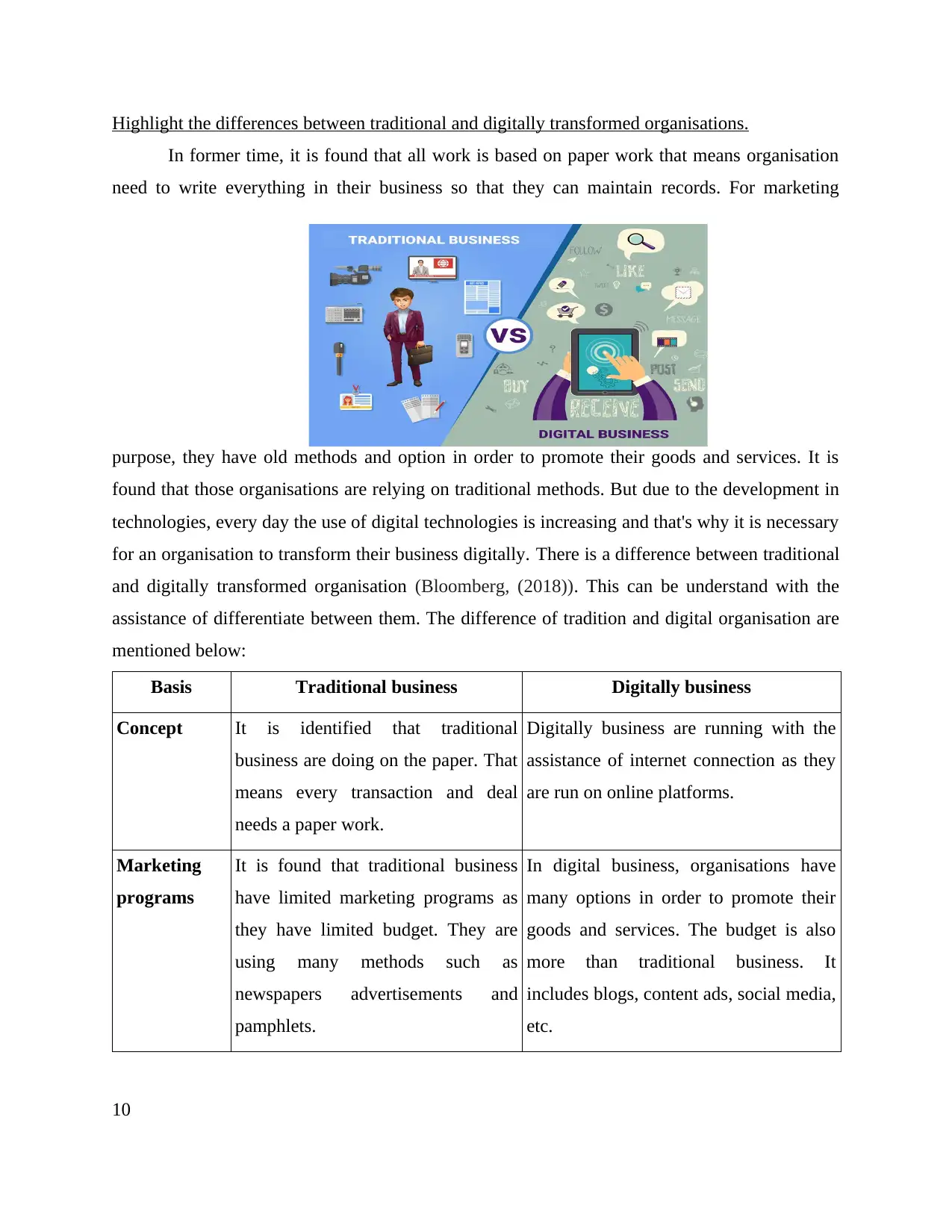
Highlight the differences between traditional and digitally transformed organisations.
In former time, it is found that all work is based on paper work that means organisation
need to write everything in their business so that they can maintain records. For marketing
purpose, they have old methods and option in order to promote their goods and services. It is
found that those organisations are relying on traditional methods. But due to the development in
technologies, every day the use of digital technologies is increasing and that's why it is necessary
for an organisation to transform their business digitally. There is a difference between traditional
and digitally transformed organisation (Bloomberg, (2018)). This can be understand with the
assistance of differentiate between them. The difference of tradition and digital organisation are
mentioned below:
Basis Traditional business Digitally business
Concept It is identified that traditional
business are doing on the paper. That
means every transaction and deal
needs a paper work.
Digitally business are running with the
assistance of internet connection as they
are run on online platforms.
Marketing
programs
It is found that traditional business
have limited marketing programs as
they have limited budget. They are
using many methods such as
newspapers advertisements and
pamphlets.
In digital business, organisations have
many options in order to promote their
goods and services. The budget is also
more than traditional business. It
includes blogs, content ads, social media,
etc.
10
In former time, it is found that all work is based on paper work that means organisation
need to write everything in their business so that they can maintain records. For marketing
purpose, they have old methods and option in order to promote their goods and services. It is
found that those organisations are relying on traditional methods. But due to the development in
technologies, every day the use of digital technologies is increasing and that's why it is necessary
for an organisation to transform their business digitally. There is a difference between traditional
and digitally transformed organisation (Bloomberg, (2018)). This can be understand with the
assistance of differentiate between them. The difference of tradition and digital organisation are
mentioned below:
Basis Traditional business Digitally business
Concept It is identified that traditional
business are doing on the paper. That
means every transaction and deal
needs a paper work.
Digitally business are running with the
assistance of internet connection as they
are run on online platforms.
Marketing
programs
It is found that traditional business
have limited marketing programs as
they have limited budget. They are
using many methods such as
newspapers advertisements and
pamphlets.
In digital business, organisations have
many options in order to promote their
goods and services. The budget is also
more than traditional business. It
includes blogs, content ads, social media,
etc.
10
Paraphrase This Document
Need a fresh take? Get an instant paraphrase of this document with our AI Paraphraser
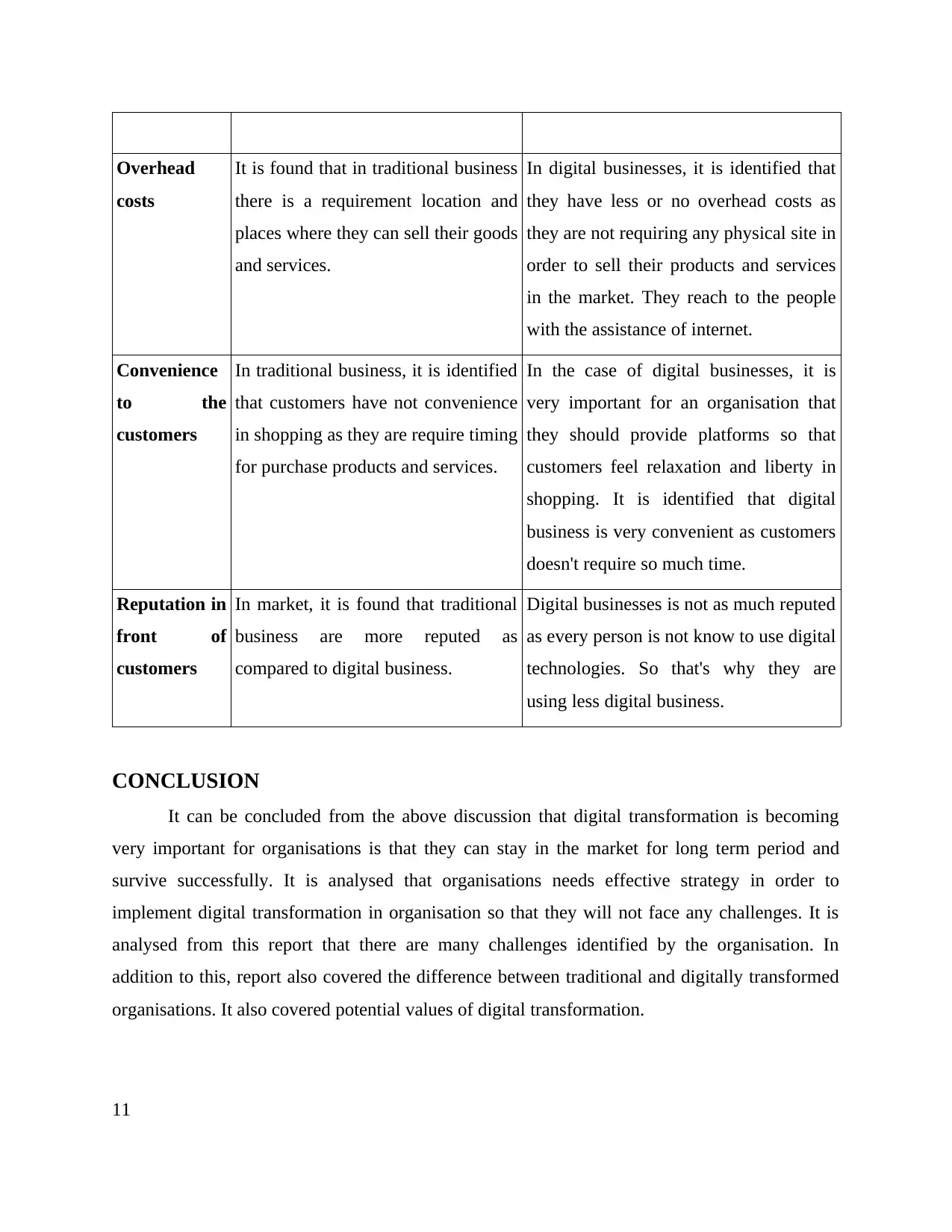
Overhead
costs
It is found that in traditional business
there is a requirement location and
places where they can sell their goods
and services.
In digital businesses, it is identified that
they have less or no overhead costs as
they are not requiring any physical site in
order to sell their products and services
in the market. They reach to the people
with the assistance of internet.
Convenience
to the
customers
In traditional business, it is identified
that customers have not convenience
in shopping as they are require timing
for purchase products and services.
In the case of digital businesses, it is
very important for an organisation that
they should provide platforms so that
customers feel relaxation and liberty in
shopping. It is identified that digital
business is very convenient as customers
doesn't require so much time.
Reputation in
front of
customers
In market, it is found that traditional
business are more reputed as
compared to digital business.
Digital businesses is not as much reputed
as every person is not know to use digital
technologies. So that's why they are
using less digital business.
CONCLUSION
It can be concluded from the above discussion that digital transformation is becoming
very important for organisations is that they can stay in the market for long term period and
survive successfully. It is analysed that organisations needs effective strategy in order to
implement digital transformation in organisation so that they will not face any challenges. It is
analysed from this report that there are many challenges identified by the organisation. In
addition to this, report also covered the difference between traditional and digitally transformed
organisations. It also covered potential values of digital transformation.
11
costs
It is found that in traditional business
there is a requirement location and
places where they can sell their goods
and services.
In digital businesses, it is identified that
they have less or no overhead costs as
they are not requiring any physical site in
order to sell their products and services
in the market. They reach to the people
with the assistance of internet.
Convenience
to the
customers
In traditional business, it is identified
that customers have not convenience
in shopping as they are require timing
for purchase products and services.
In the case of digital businesses, it is
very important for an organisation that
they should provide platforms so that
customers feel relaxation and liberty in
shopping. It is identified that digital
business is very convenient as customers
doesn't require so much time.
Reputation in
front of
customers
In market, it is found that traditional
business are more reputed as
compared to digital business.
Digital businesses is not as much reputed
as every person is not know to use digital
technologies. So that's why they are
using less digital business.
CONCLUSION
It can be concluded from the above discussion that digital transformation is becoming
very important for organisations is that they can stay in the market for long term period and
survive successfully. It is analysed that organisations needs effective strategy in order to
implement digital transformation in organisation so that they will not face any challenges. It is
analysed from this report that there are many challenges identified by the organisation. In
addition to this, report also covered the difference between traditional and digitally transformed
organisations. It also covered potential values of digital transformation.
11
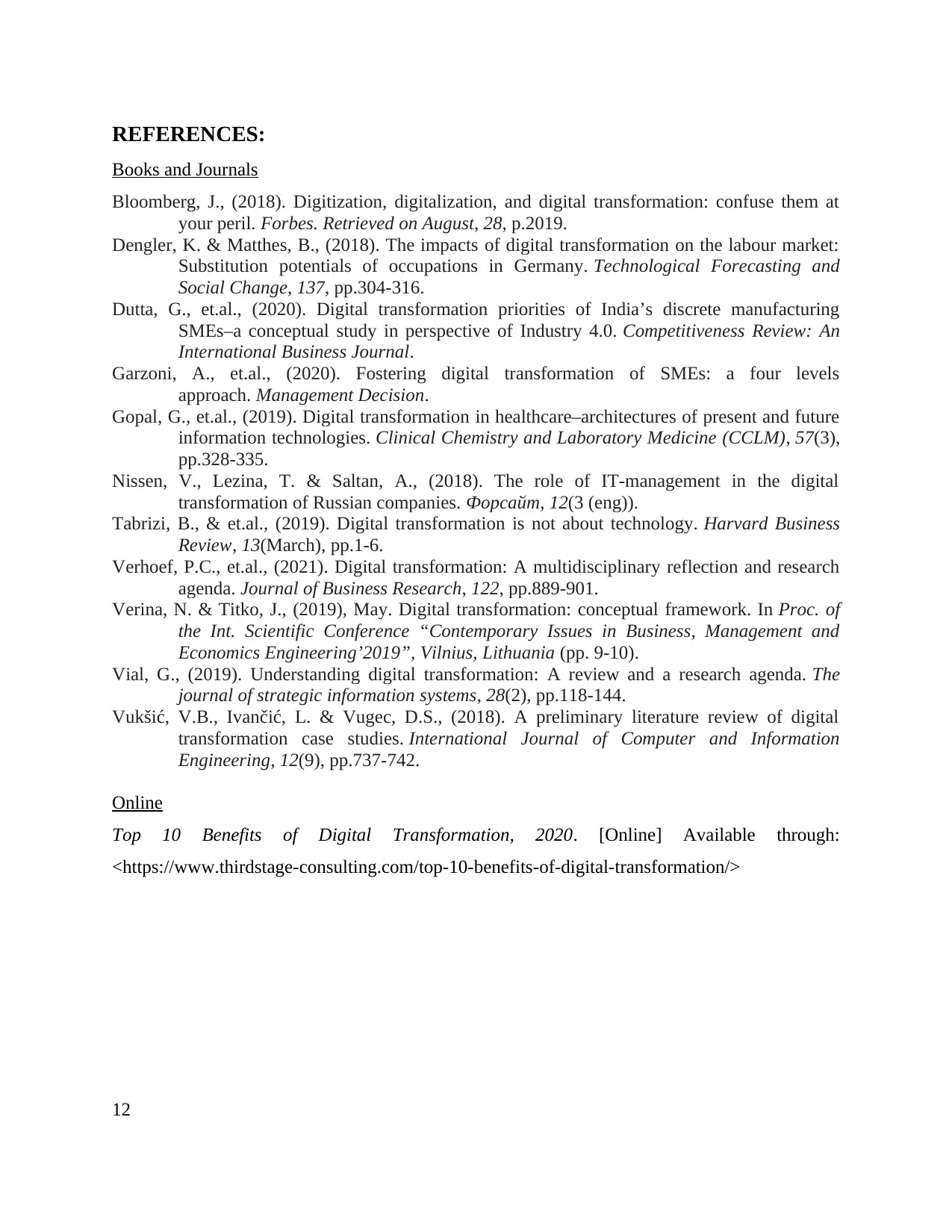
REFERENCES:
Books and Journals
Bloomberg, J., (2018). Digitization, digitalization, and digital transformation: confuse them at
your peril. Forbes. Retrieved on August, 28, p.2019.
Dengler, K. & Matthes, B., (2018). The impacts of digital transformation on the labour market:
Substitution potentials of occupations in Germany. Technological Forecasting and
Social Change, 137, pp.304-316.
Dutta, G., et.al., (2020). Digital transformation priorities of India’s discrete manufacturing
SMEs–a conceptual study in perspective of Industry 4.0. Competitiveness Review: An
International Business Journal.
Garzoni, A., et.al., (2020). Fostering digital transformation of SMEs: a four levels
approach. Management Decision.
Gopal, G., et.al., (2019). Digital transformation in healthcare–architectures of present and future
information technologies. Clinical Chemistry and Laboratory Medicine (CCLM), 57(3),
pp.328-335.
Nissen, V., Lezina, T. & Saltan, A., (2018). The role of IT-management in the digital
transformation of Russian companies. Форсайт, 12(3 (eng)).
Tabrizi, B., & et.al., (2019). Digital transformation is not about technology. Harvard Business
Review, 13(March), pp.1-6.
Verhoef, P.C., et.al., (2021). Digital transformation: A multidisciplinary reflection and research
agenda. Journal of Business Research, 122, pp.889-901.
Verina, N. & Titko, J., (2019), May. Digital transformation: conceptual framework. In Proc. of
the Int. Scientific Conference “Contemporary Issues in Business, Management and
Economics Engineering’2019”, Vilnius, Lithuania (pp. 9-10).
Vial, G., (2019). Understanding digital transformation: A review and a research agenda. The
journal of strategic information systems, 28(2), pp.118-144.
Vukšić, V.B., Ivančić, L. & Vugec, D.S., (2018). A preliminary literature review of digital
transformation case studies. International Journal of Computer and Information
Engineering, 12(9), pp.737-742.
Online
Top 10 Benefits of Digital Transformation, 2020. [Online] Available through:
<https://www.thirdstage-consulting.com/top-10-benefits-of-digital-transformation/>
12
Books and Journals
Bloomberg, J., (2018). Digitization, digitalization, and digital transformation: confuse them at
your peril. Forbes. Retrieved on August, 28, p.2019.
Dengler, K. & Matthes, B., (2018). The impacts of digital transformation on the labour market:
Substitution potentials of occupations in Germany. Technological Forecasting and
Social Change, 137, pp.304-316.
Dutta, G., et.al., (2020). Digital transformation priorities of India’s discrete manufacturing
SMEs–a conceptual study in perspective of Industry 4.0. Competitiveness Review: An
International Business Journal.
Garzoni, A., et.al., (2020). Fostering digital transformation of SMEs: a four levels
approach. Management Decision.
Gopal, G., et.al., (2019). Digital transformation in healthcare–architectures of present and future
information technologies. Clinical Chemistry and Laboratory Medicine (CCLM), 57(3),
pp.328-335.
Nissen, V., Lezina, T. & Saltan, A., (2018). The role of IT-management in the digital
transformation of Russian companies. Форсайт, 12(3 (eng)).
Tabrizi, B., & et.al., (2019). Digital transformation is not about technology. Harvard Business
Review, 13(March), pp.1-6.
Verhoef, P.C., et.al., (2021). Digital transformation: A multidisciplinary reflection and research
agenda. Journal of Business Research, 122, pp.889-901.
Verina, N. & Titko, J., (2019), May. Digital transformation: conceptual framework. In Proc. of
the Int. Scientific Conference “Contemporary Issues in Business, Management and
Economics Engineering’2019”, Vilnius, Lithuania (pp. 9-10).
Vial, G., (2019). Understanding digital transformation: A review and a research agenda. The
journal of strategic information systems, 28(2), pp.118-144.
Vukšić, V.B., Ivančić, L. & Vugec, D.S., (2018). A preliminary literature review of digital
transformation case studies. International Journal of Computer and Information
Engineering, 12(9), pp.737-742.
Online
Top 10 Benefits of Digital Transformation, 2020. [Online] Available through:
<https://www.thirdstage-consulting.com/top-10-benefits-of-digital-transformation/>
12
⊘ This is a preview!⊘
Do you want full access?
Subscribe today to unlock all pages.

Trusted by 1+ million students worldwide
1 out of 12
Related Documents
Your All-in-One AI-Powered Toolkit for Academic Success.
+13062052269
info@desklib.com
Available 24*7 on WhatsApp / Email
![[object Object]](/_next/static/media/star-bottom.7253800d.svg)
Unlock your academic potential
Copyright © 2020–2026 A2Z Services. All Rights Reserved. Developed and managed by ZUCOL.



